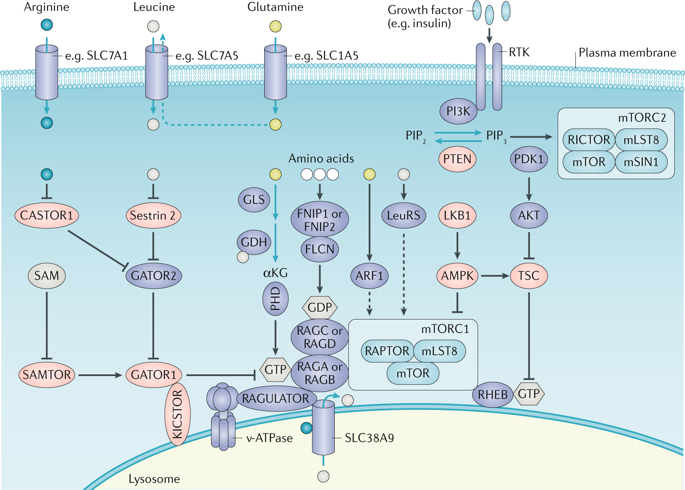Nature Reviews Cancer ( IF 72.5 ) Pub Date : 2018-11-13 , DOI: 10.1038/s41568-018-0074-8
Dirk Mossmann , Sujin Park , Michael N. Hall

|
Oncogenic signalling and metabolic alterations are interrelated in cancer cells. mTOR, which is frequently activated in cancer, controls cell growth and metabolism. mTOR signalling regulates amino acid, glucose, nucleotide, fatty acid and lipid metabolism. Conversely, metabolic inputs, such as amino acids, activate mTOR. In this Review, we discuss how mTOR signalling rewires cancer cell metabolism and delineate how changes in metabolism, in turn, sustain mTOR signalling and tumorigenicity. Several drugs are being developed to perturb cancer cell metabolism. However, their efficacy as stand-alone therapies, similar to mTOR inhibitors, is limited. Here, we discuss how the interdependence of mTOR signalling and metabolism can be exploited for cancer therapy.
中文翻译:

mTOR信号传导和细胞代谢是癌症的共同决定因素
致癌信号和代谢改变在癌细胞中相互关联。mTOR在癌症中经常被激活,它控制细胞的生长和代谢。mTOR信号传导调节氨基酸,葡萄糖,核苷酸,脂肪酸和脂质代谢。相反,代谢输入(例如氨基酸)激活mTOR。在这篇综述中,我们讨论了mTOR信号如何重新改变癌细胞的新陈代谢,并描述了新陈代谢的变化如何继而维持mTOR信号和致瘤性。正在开发几种药物来扰乱癌细胞的新陈代谢。但是,与mTOR抑制剂相似,它们作为独立疗法的功效有限。在这里,我们讨论如何可以利用mTOR信号转导和代谢的相互依赖性进行癌症治疗。

































 京公网安备 11010802027423号
京公网安备 11010802027423号